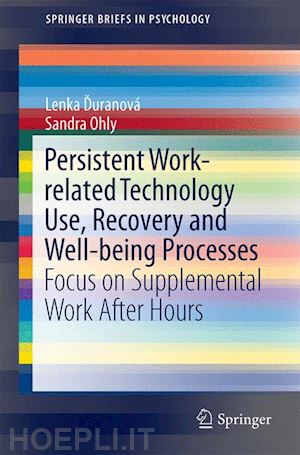
Questo prodotto usufruisce delle SPEDIZIONI GRATIS
selezionando l'opzione Corriere Veloce in fase di ordine.
Pagabile anche con Carta della cultura giovani e del merito, 18App Bonus Cultura e Carta del Docente
The aim of this work is to provide insight into the process of employee recovery and well-being in regard to work-related ICT use during after-hours. Therefore, we discuss (1) theories that help us to understand the determinants and outcomes of this behavior, (2) our core concepts recovery and well-being, and (3) previous empirical findings on ICT use after hours for work purposes. On the basis of literature review, we propose a new conceptual overall framework of ICT use after hours for work purposes with the focus on employee recovery and well-being processes. Thereby, we posit ICT use after hours for work purposes as potential stressor, resource, or demand (see action theory by Hacker, 1998, 2003; Frese and Zapf 1994), depending on many personal and environmental factors, but primarily on cognitive appraisals (see transactional model of stress by Lazarus and Folkman 1984). This three-way division enables us to propose various linear and non-linear associations to focused outcomes. We conclude with an overall discussion on further research concerning the identified research gaps.
Dr. Lenka Duranová is research associate of business psychology at the University of Kassel, Germany. She received a PhD in Literary and Cultural Studies from the Gießen University, Germany in 2009. Her dissertation focused on motivation behind suicide. Lenka’s research interests include employee well-being, occupational stress, and work attitudes. Her current research examines the role of work-related use of new technology after hours for daily fluctuations in well-being.
Dr. Sandra Ohly is professor in business psychology at the University of Kassel, Germany since 2010. She received her PhD from the Technical University of Braunschweig, Germany in 2005, and her habilitation from the Goethe University Frankfurt, Germany in 2010. Her research focuses on well-being, creativity, and proactive behavior. She is also interested in affective and motivational processes, oftentimes using diary methods. In a recent research project she examines how smartphone use after hours relates towell-being and work-home interference. Her research has been published in Journal of Organizational Behavior, Journal of Applied Psychology, Journal of Occupational and Organizational Psychology, and Journal of Business and Psychology. She is associate editor of Journal of Personnel Psychology, and member of the editorial board of Journal of Organizational Behavior, Journal of Occupational and Organizational Psychology, and Journal of Business and Psychology.











Il sito utilizza cookie ed altri strumenti di tracciamento che raccolgono informazioni dal dispositivo dell’utente. Oltre ai cookie tecnici ed analitici aggregati, strettamente necessari per il funzionamento di questo sito web, previo consenso dell’utente possono essere installati cookie di profilazione e marketing e cookie dei social media. Cliccando su “Accetto tutti i cookie” saranno attivate tutte le categorie di cookie. Per accettare solo deterninate categorie di cookie, cliccare invece su “Impostazioni cookie”. Chiudendo il banner o continuando a navigare saranno installati solo cookie tecnici. Per maggiori dettagli, consultare la Cookie Policy.